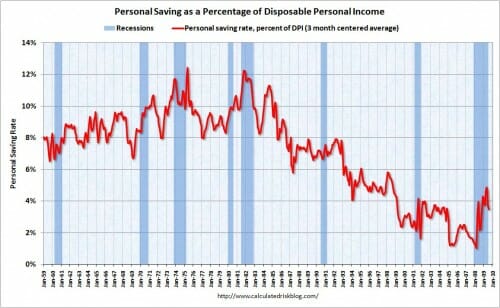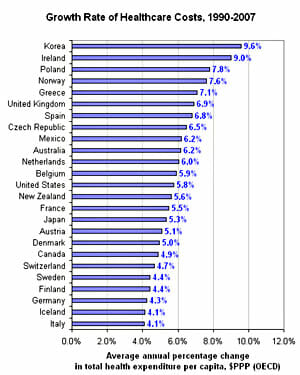First, the background. Veronique de Rugy writes something that is undeniably true, though the Left has played semantic games with words like "trust fund" and "lockbox" for years to try to "shelter" the public from this reality:
In practice, [] the trust fund and interest payments it receives are simply accounting fiction. For years, the federal government has been borrowing the Social Security Trust Fund assets for its daily spending. The fund has nothing left in it except IOUs from the federal government. In fact, even the interest is paid in IOUs.
Hence, the only way Social Security will not go into the red this year and in future years is if the federal government pays back Social Security. But since the money has long ago been consumed, it must borrow money from the public or raise taxes to pay its Social Security debts.
In response, Kevin Drum whips out this absolutely stunning statement:
Back in 1983, we made a deal. The deal was this: for 30 years poor people would overpay their taxes, building up the trust fund and helping lower the taxes of the rich. For the next 30 years, rich people would overpay their taxes, drawing down the trust fund and helping lower the taxes of the poor.1
Well, the first 30 years are about up. And now the rich are complaining about the deal that Alan Greenspan cut back in 1983. As it happens, I agree that it was a bad deal. If it were up to me, I'd fund Social Security out of current taxes and leave it at that. But it doesn't matter. Once the deal is made, you can't stop halfway through and toss it out. The rich got their subsidy for 30 years, and soon it's going to be time to raise their taxes and use it to subsidize the poor. Any other option would be an unconscionable fraud.
I really had a WTF moment when reading this. Its hard to know where to start, so here are some reactions in semi-random order:
- For those of you over 40, do you remember such a deal? No, you don't, because there never was one. What happened was that Congress decided to sweep the Social Security surplus into the deficit calculation in order to disguise the magnitude of unsustainable spending, to help prevent the kind of electoral backlash we may well see later this year. This is Soviet-style history making.
- Here is a thought problem: Picture Tip O'Neil, Speaker of the Democrat dominated House of Representatives at the time, publicly signing on to a deal that the poor would pay higher taxes for 30 years to give the rich a tax break. It is a total joke to even consider. The absurdity of such a notion is mind-boggling.
- It took me a while to parse this and figure out what he was even talking about. For example, there was never a tax increase to the poor during the 1980's, so what does he mean that the poor would pay more for 30 years? The only way this can even be the correct view of the world is if one makes two assumptions:
- Everything Congress chooses to spend money on is perfectly, morally justifiable and therefore spending levels are a fact of nature beyond our ability to challenge or question
- Rich people have the moral obligation to pay for all incremental government programs, and all budget gaps will be closed by new taxes on rich people. Taxes on rich people, as a corollary, are never too high.
Given these assumptions, then the "Deal" sort of kind of makes sense. By the progressive "logic" of these two assumptions, social security taxes in an alternate world would have been reduced during the surplus and the general budget deficit would have been filled not with social security surpluses but higher taxes on the rich.
- The previous logic depends on treating social security taxes as unfairly regressive taxes as part of an income transfer / welfare program. If you treat them as premiums in an insurance program, the retroactive logic trying to cast this as a "deal" in 1983 doesn't work. Interestingly, many on the left in other forums have argued against calling social security taxes anything but insurance premiums, including....Kevin Drum
The men in my family of my father's generation returned home after serving their country and got jobs in the local steel mills, as had their fathers and their grandfathers. In exchange for their brawn, sweat, and expertise, the steel mills promised these men certain benefits. In exchange for Social Security taxes withheld from their already modest paychecks, the government promised these men certain benefits as well.
"¦.These were church-attending, flag-waving, football-loving, honest family men. They are rightfully proud of providing homes and educations for their children and instilling the sorts of values and manners that serve them well as adults. And if I have to move heaven and earth, now that they've retired, the Republican party is NOT going to redefine them as welfare recipients.
- Note by the way, that if this really is an insurance program, any private insurer or private pension fund managers in America would be in jail had they done what our trustworthy federal government did. In effect, they spent other people's pension money on current operations.
If we want to describe the last 30 year history of Social Security surpluses as a deal, here is what the actual deal was without ex post facto varnish: Congress in the eighties said that they were going to spend that surplus money now to get themselves re-elected, and some other Congress 30 years hence would have to figure out how to deal with the bare cupboard. That was the deal. It was a simple screw you to future generations.
Drum, given his progressive assumptions, fantasizes a deal based on his assumption that the only way to fill in the hole is with higher taxes on the rich, because his mind is incapable of wrapping itself around any other alternatives (see the two assumptions above).
But it is worth noting that the surplus was in the main handed away by the Democrats to the poor and middle class through new entitlement spending. Its hard to figure how a series of actions that took seniors pensions and frittered it away in a variety of programs that at best helped the poor and in reality probably helped no one but government bureaucrats somehow obligates the rich to pay 30 years of new taxes to clean the whole mess up.


